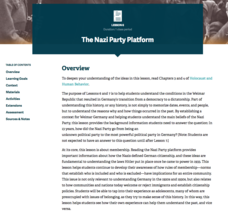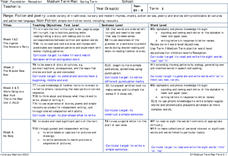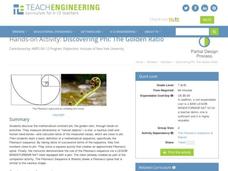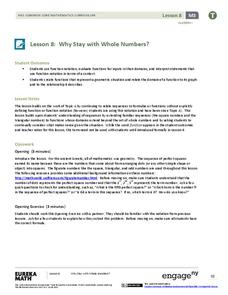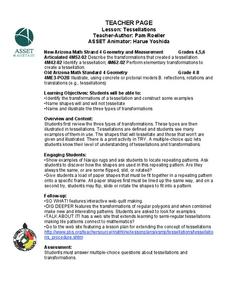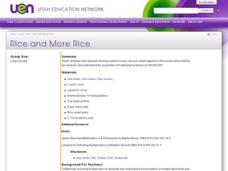Maryland Department of Education
The Concept of Identity Lesson 4: The Psychological Approach
Readers apply Sigmund Freud's theories of the unconscious mind and the psychological approach to literary criticism to analyze and evaluate the relationship between two characters in A Separate Peace.
NOAA
Mapping the Deep-Ocean Floor
How do you create a map of the ocean floor without getting wet? Middle school oceanographers discover the process of bathymetric mapping in the third installment in a five-part series of lessons designed for seventh and eighth graders....
02 x 02 Worksheets
Inverse Functions
Young mathematicians look for patterns in inverse functions as they relate to the original functions. The comprehensive lesson emphasizes vocabulary throughout as well as algebraic and graphical characteristics of the inverse functions.
Facing History and Ourselves
The Nazi Party Platform
Not all party platforms stay democratic. A resource covers many political issues in Germany during the time of World War II, and teaches pupils about the Nazi party platform and what went wrong. Individuals participate in a warm-up...
Curated OER
My Foot and the Standard Foot
Young mathematicians put one foot in front of the other as they learn how to measure length in an elementary math lesson. Using paper cutouts of their own feet, children measure classroom objects as they discover the importance of...
NOAA
History's Thermometers
How is sea coral like a thermometer? Part three of a six-part series from NOAA describes how oceanographers can use coral growth to estimate water temperature over time. Life science pupils manipulate data to determine the age of corals...
Polar Trec
Ozone Data Comparison over the South Pole
Did you know the hole in the ozone is seasonal and filled by January every year? The lesson uses scientific measurements of the ozone over the South Pole to understand patterns. Scholars learn that the hole grew bigger annually before...
NOAA
To Explore Strange New Worlds
It's time to boldly go where your class has not gone before! The introductory lesson in a five-part series takes young oceanographers aboard the NOAA Ship Okeanos to begin a study of ocean exploration. The lesson includes a comparison of...
Curated OER
Paper Folding to Make Cubes
Examine patterns of figures composed of six-squares and predict which of the twenty presented could be folded to make a cube. They then fold large-scale patterns of these figures to confirm their hunches.
Curated OER
The Function Box
Students look around classroom and identify any patterns they see, describe patterns and explain why they are patterns, use pencil to demonstrate arithmetic patterns by tapping, practice predicting patterns by using Function Box, and...
Curated OER
Fiction and Poetry
Pupils explore fictional text and poetry. They explore the story structures used in the types of texts and examine the language patterns used. Students practice tracking text in the correct manner.
Curated OER
Shapes, Patterns, and Plants
Students imagine they are animals in the Palace Facade painting. In this Palace Facade lesson plan, students observe and discuss the geometric and organic shapes in the painting shown to them.
Teach Engineering
Discovering Phi: The Golden Ratio
Fe, phi, fo, fum. This activity leads pairs to find the ratio of consecutive terms of the Fibonacci sequence. The pairs find that the Fibonacci sequence can be found in many places. A discussion with the class shows that the ratios found...
EngageNY
Why Stay with Whole Numbers?
Domain can be a tricky topic, especially when you relate it to context, but here is a lesson that provides concrete examples of discrete situations and those that are continuous. It also addresses where the input values should begin and...
Howard Hughes Medical Institute
Weighing the Evidence for a Mass Extinction: Part 1 – In the Ocean
Extinction events have happen throughout geologic history, but only five mass extinctions occurred over the last 4.5 billion years. Scholars view fossils from a layer of sediment during an extinction event and observe patterns to draw...
Curated OER
Calculator Pattern Puzzles
Students explore number patterns and relationships while being introduced to the calculator at the same time.
Curated OER
Kente Cloth
Students explore patterns and identify, extend, and translate color patterns. They discuss the origin and function of Kente cloth from Ghana, and discuss the patterns they see in students' clothing. Students color in a variety of...
Curated OER
Leaves, Flowers, Seashells, Mirrors and Symmetry
Students develop an understanding of patterns and symmetry. In this symmetry and pattern lesson, students use real world patterns then analyze and extend them. Students also use real world items while discovering and observing symmetry.
Curated OER
Tessellations
Learners form repeating patterns using tessellations. In this tessellations lesson, students identify shapes and illustrate three types of transformations. A website is included with the lesson which provides extension activities and...
Curated OER
Linear Functions
Fifth graders investigate the concept of a function in relationship to how it is used. The concept is essential for the future study of Algebra. They apply the use of patterns with its relationship to functions.
Curated OER
Rice and More Rice
Fifth graders explore problem solving strategies for mathematical estimation. In this math problem solving lesson, 5th graders predict how many grains of rice are in a jar, practice establishing and looking for patterns in...
Curated OER
Native American Necklaces
First graders make an "ABB" pattern from macaroni they dyed in a previous lesson. They follow the pattern as they string the macaroni to make a necklace. This lesson is a nice math/social studies tie in.
Curated OER
Patterns In Hexagon Tables
Sixth graders construct a rule about the number of sides found in a pattern of hexagons. In this mathematical problem solving lesson, 6th graders observe different hexagon patterns and create a rule about the relationship between the...
Curated OER
Making Connections
Seventh graders relate patterns with higher math. In this 7th grade math lesson, 7th graders analyze different methods of portraying data. They relate the data to real life scenarios.





